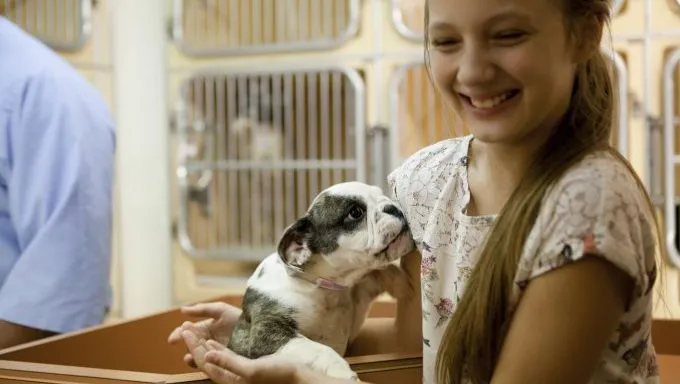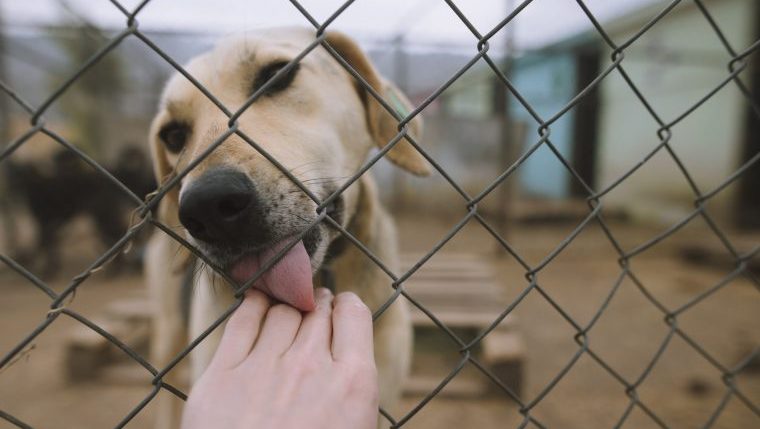
There’s an overwhelming amount of dogs waiting in shelters and rescues for new homes. It’s often assumed that all of these dogs are mixed breeds (for the record, mutts don’t equal bad dogs!). However, it’s increasingly common to find purebred dogs in shelters. Fans of some breeds may be surprised to find their omnipresence in local shelters. For some breeds, this simply means they’ve been bred in abundance. For other breeds, it may be due to high care requirements that are surprising to new adopters. This list covers the most common dog breeds in shelters you’re most likely to find up for adoption in your local shelter.
American Bulldog
The American Bulldog is a strong-willed but loyal breed that is equally adept at being a watchdog and a family pet. Why is this one of the most common dog breeds in shelters? Their high exercise requirements and stubborn dispositions can be too much for some dog owners. Additionally, due to being a “bully breed,” they are prohibited by some rental properties. However, for experienced owners who don’t mind daily jogs and training sessions, the American Bulldog can be a great fit.
American Pit Bull Terrier
The American Pit Bull Terrier, more frequently known as simply the Pit Bull, is one of the most controversial dog breeds. This breed, through no fault of their own, has been used for dogfighting extensively, tarnishing the breed’s reputation. This has made them a common “banned breed,” forcing some loving owners to give up their dogs for housing. This dog breed is strong-willed and high-energy, but undeserving of their reputation. For a dedicated and experienced owner, the Pit Bull can make an amazing jogging partner and cuddle buddy.
American Staffordshire Terrier
Similarly to the Pit Bull, the American Staffordshire Terrier is just as frequently criticized as they are beloved. The Amstaff is an energetic breed, but highly trainable and playful. They’re also one of the most commonly bred dogs in America, leading to a spillover into the shelter population. When you’re looking for a new dog, you’re likely to find an overwhelming amount of bully breeds. If you have the time and energy, give them a chance. They can be some of the most devoted dogs out there.
Beagle
The short and spunky Beagle is common in many shelters, but especially prevalent in the South. Why? This breed’s talent for hunting has led to overbreeding for this sport. Some Beagles aren’t suited for hunting, or they get too old to perform the job well. This leads some owners to just giving the dog up rather than keeping them as a companion. However, for those that have the time to entertain the clownish Beagle, they can be a great family pet that loves children.
Boxer
Originally bred to be a medium-sized guard dog, the unique Boxer is one of America’s favorite family pets. This breed is loyal and often goofy in personality. However, their high shelter surrender rate is likely due to factors that make them inconvenient for some households. For example, Boxers have a short lifespan; it isn’t uncommon for Boxers to pass away of old age as early as 8 years old. Without proper training, Boxers can also deal with resource guarding and food aggression issues. However, this doesn’t automatically mean all shelter-bound Boxers have behavior issues. For knowledgeable dog owners who love the breed, a rescue Boxer could be a perfect match.
Chihuahua
As a long-beloved breed and perfect apartment dog, it’s hard to imagine why anyone wouldn’t want their Chihuahua. But even the tiniest breeds can have issues owners don’t anticipate. Chihuahuas are one of America’s most common dogs, which statistically leads to many surrenders. However, they also have long lifespans; some people who adopt a young dog may not expect them to live past the next decade. Additionally, untrained Chihuahuas may have irritating barks that grate on neighbors’ nerves. For patient owners who are willing to spend time training even a small dog, a Chihuahua will bring lots of love and laughter.
Dachshund
Once bred to hunt small animals down tunnels, today the Dachshund is more common as a household companion. However, some of their ancestral instincts haven’t been left behind. Due to their high prey drives, Dachshunds can be a problematic fit for households with small animals or even cats. Additionally, Dachshunds are prone to aggression with dogs and other people. While these behaviors are often avoidable if the dog is socialized from a young age, frustrated owners may just give up. This breed also lives for quite a while, so you may find a perfectly well-mannered senior Dachshund waiting for a home at your local shelter.
German Shepherd
While there’s much to love about the iconic German Shepherd, there are also many reasons why this breed isn’t a good match for everyone. This breed has an extremely high drive, which makes them perfect for police work or similar jobs. However, their strong-willed natures and tendencies towards aggression can make them challenging as family companions. For somebody that has the time to work with and properly exercise this breed, they will be rewarded with an endlessly loyal family companion.
Jack Russell Terrier
Once bred to hunt foxes in England, the Jack Russell Terrier has retained every ounce of their spunk and bravery over the years. This small dog has a huge personality, and they can be surprisingly hard to handle, even for experienced owners. Their stubbornness means that training can be a hassle, and they’re additionally prone to reactivity. But there are just as many good qualities to this breed, such as their entertaining and playful nature and their intelligence.
Labrador Retriever
One of America’s favorite family pets, the Labrador Retriever is also one of the most common shelter dogs. This breed is known for their affable and gentle nature, which makes them an exceptional first dog for children. Some Labs are hyperactive or difficult to train, but just as many are calm and responsive to training. The overwhelming surrender numbers for Labs likely have more to do with the large quantities of them bred yearly, not any flaw with the breed itself.
Why are some dog breeds more common in shelters than others?
Many dogs find themselves in shelters or rescues through no fault of their own. Largely, owners find out that a breed isn’t the right fit for them a little too late. They may not have known the extent of a dog’s breed-specific health issues, lifespan, exercise requirements, or even their personality. This means that, while the dog may have been a good fit for another person, they end up at a shelter or rescue just for behaving normally. Additionally, some dogs, such as Pit Bulls and Labradors, are just very common; they are more likely to be surrendered due to sheer numbers.
More information on adopting from shelters
To learn more about adopting from shelters, check out our guide to choosing the right animal shelter as well as our checklist for adopting a shelter dog.









